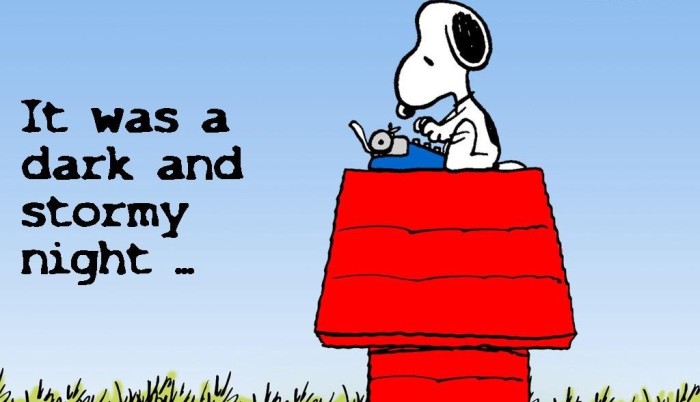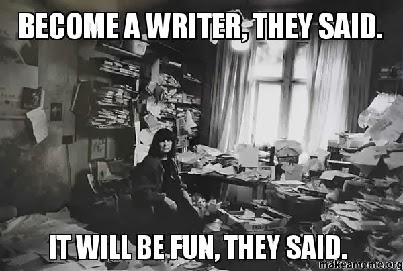7 Handy Hints for Writing Your First Novel
Since it’s the New Year, I’m sure many of you have made resolutions and, for some, one of those might be to write your first novel.
Last year, after getting rejected by numerous publishers, I decided to self publish my first book: Beyond The Luna.
It did extremely well for a debut novel – hitting the best seller list on iTunes and it’s been downloaded over 10,000 times worldwide.
Writing a book may seem daunting, but, with the right preparation, a monkey could do it… Some believe one could write the entire works of Shakespeare, but let’s not talk infinite monkey theorem, let’s talk books!
Here are 7 tips that I’d love to share with you:
1. Keep Quiet
Stop telling people you’re writing a book… And just write the book.
Now, this may seem like an odd first tip, but it’s a huge pet peeve of mine. If someone credited my bank account with a £100 for every time a person said, ‘I’ve got a book in me’ or ‘I’d love to write a book some day’, I’d be a very rich man.
A book won’t write itself, and telling people you’re writing a book certainly wont fill the pages with words.
YOU have to write it, and to achieve this, you must let your writing do the talking.
2. Perfect Planning
Know your characters inside and out. Learn their habits and vices. How do they stand or talk? Do they have any distinctive features or characteristics? It may sound trivial, but if you achieve this, your characters will leap off the page.
Gillian Flynn, author of Gone Girl, even creates iTunes/Netflix playlists for her characters.
As for scenes and the story – just write everything down. It doesn’t matter if some don’t make the cut – you just want to cultivate the habit of writing.
A hot water tap is cold at first – but if you leave it running it eventually gets warm soon it gets boiling hot. The same applies to writing.
3. Start Writing
Don’t worry if you’ve never written anything before, the most important thing you can do is just start writing.
Write what you know. I used to work in retail and I have multitudes of humorous real life scenarios written down. So, if you work in an office or a bookstore, etc., use some examples you can remember.
Write for you, not the audience. When I’ve written scenes that I think audiences will love, it turns out that the reader usually prefers the scenes that I really loved writing. When writing comedy, write what you find funny, not what you think others will find funny.
Some days the writing can flow, other days it’s a struggle, but if you don’t sit down to write every day, you’ll never find the good days.

(Image via)
4. The Purple Pitfall
When attempting a first novel one common mistake is to fill it with ostentatious descriptions – often called purple prose.
‘She wrapped her thin, cold fingers around the warm coffee mug. The steam rose from the ceramic vessel and danced off her dry cracked lips that were once ruby red. The dark coffee tantalised her sensitive tongue and made her…’
Yeah, you get it.
Keep it simple – sometimes less is more.
No matter how many beautiful descriptions you feed me, they’ll fall on deaf ears if there’s no story.
5. Creative Roadblocks
Whilst writing, you might come across a few setbacks. Here are some things you can do to alleviate the problems.
Exercise. Sitting in front of a computer screen can be tiresome. Go for a run, lift weights, do some yoga. Staying active will get you out of your mind, and back in your body.
Take a nap. James Cameron’s the Terminator and Stephen King’s Misery – are just a few ideas evoked from dreams or nightmares!
Leave the house. Go anywhere that inspires you. The library, the coffee shop, the dry cleaners! Just go somewhere different and let your mind wander.
6. Redrafts and Rewrites
After a few months of writing, you should reach your first draft. Now the real fun begins. Redrafts and rewrites! (Sarcasm).

(Image via)
‘I’ve never written a first draft that didn’t make me think “anyone who read it would immediately cut ties with me as a person”‘ – Jen Statsky.
No it’s not all that bad. For starters, you can read your story from start to finish and see how it reads. I’d say it’s best to take a two week break and come back to it with your mind fresh.
Get it proofread. I made the mistake of not proofing my novel and published it with a few typos here and there. In the ruthless arena of book reviews, some people weren’t so kind. Fortunately, the majority focused on its story.
7. Publishing
If you choose to approach literary agents and publishers, you can find everything you need via the Internet and the Writers’ & Artists’ Yearbook.
If you choose to self publish, visit Createspace and follow the instructions on their website. Bear in mind that you’ll need a front cover design and an ISBN.
Once those requirements are met, Createspace will upload the book to Amazon and you can start ordering copies!

(Image via)
Epilogue
Whatever happens, writing a book is an incredible thing. If all goes well, you’ll end up with a story that you love, and no one can ever take that away from you.
Now get out there and start writing!
If you enjoyed this article, why not check out ‘“Go Out, Do Your Thing, Don’t Look Back”: An Interview with Audrey the Artist‘?
Tags: advice Joy motivation novel writing
Categories: Wise up!
2 Comments
Hi joaquim!
Twitter is too short so I’m posting here! I read Beyond the luna recently and it was so inspiring and now I’m thinking of writing my own book. I’m looking forward to echo in the forest now! when are you releasing it?
Angie xxx
Hey Angie,
Thanks for reading Beyond The Luna. I’m glad you enjoyed it!
You can find out more about Echo In The Forest here
https://www.facebook.com/EchoInTheForest
Good luck with your book! & Make sure to check out some of the other great articles on this site!
Best wishes.
Joaquim Silva.